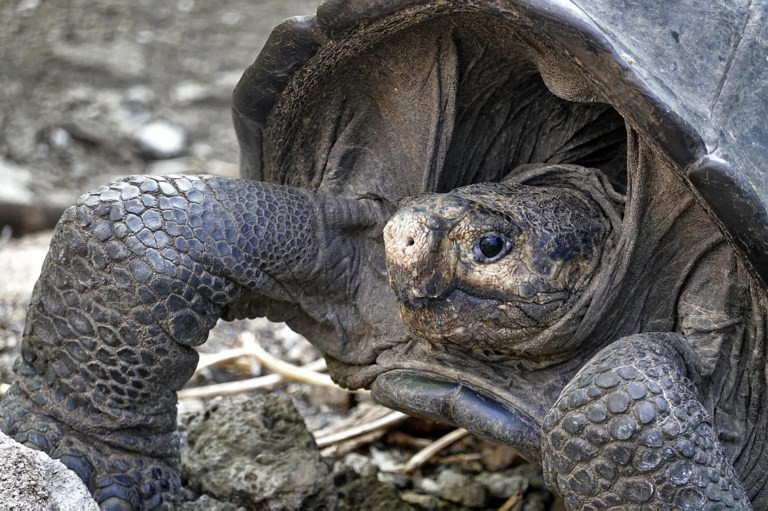Popular Reads
Top Results
Can't find what you're looking for?
View all search resultsPopular Reads
Top Results
Can't find what you're looking for?
View all search resultsScientists to search for relatives of extinct Galapagos tortoises
A scientific expedition to the Galapagos Islands will spend ten days searching for relatives of two tortoise species believed to be extinct, including those of the archipelago's Lonesome George.
Change text size
Gift Premium Articles
to Anyone
 A specimen of the giant Galapagos tortoise Chelonoidis phantasticus, thought to have gone extinct about a century ago, is seen at the Galapagos National Park on Santa Cruz Island in the Galapagos Archipelago, in the Pacific Ocean 1000 km off the coast of Ecuador, on February 19, 2019. (AFP/Rodrigo Buendia)
A specimen of the giant Galapagos tortoise Chelonoidis phantasticus, thought to have gone extinct about a century ago, is seen at the Galapagos National Park on Santa Cruz Island in the Galapagos Archipelago, in the Pacific Ocean 1000 km off the coast of Ecuador, on February 19, 2019. (AFP/Rodrigo Buendia)
A
scientific expedition to the Galapagos Islands will spend ten days searching for relatives of two tortoise species believed to be extinct, including those of the archipelago's Lonesome George, park officials said Friday.
George, the last known member of the Pinta tortoise species, died in 2012 at over 100 years of age after refusing to mate in captivity with females from related subspecies.
Park rangers and scientists from the Galapagos National Parks (PNG) and Galapagos Conservancy will tour the Wolf Volcano on Isabela Island in hopes of "locating and removing a group of giant tortoises with partial lineage" to the extinct Pinta and Floreana species, the park said in a statement.
They chose the area because whalers and pirates who would eat the animals were thought to have dumped some of the tortoises there in the past to lighten their ships' loads.
The Galapagos Islands, located 1,000 kilometers off the coast of Ecuador in the Pacific Ocean, were made famous by Charles Darwin's studies of their breathtaking biodiversity.
Read also: Species-saving Galapagos giant tortoise Diego can take a rest
In 2008, a similar expedition took blood samples from 1,726 tortoises, 17 of which had a "significant percentage" of genes in common with the Pinta species while about 80 showed a "partial lineage" to the Floreana species, PNG said.
Studies have found "tortoises that have up to 90 percent of the extinct species' genes, meaning that at least one of their parents is a purebred and possibly lives on Wolf Volcano," said Jorge Carrion, the park's director.
The expedition is searching for suitable tortoises to begin a breeding program in captivity with the hope of eventually repopulating the islands, said expedition leader Washington Tapia.
Eleven giant tortoise species remain on the Galapagos Islands, while four others have been classified as extinct since Darwin's 1835 arrival.









